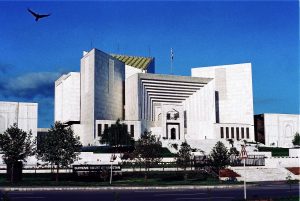Pakistan’s Parliament recently passed the 26th constitutional amendment, also known as the Constitutional Package. This marks a significant shift in the balance of power between the government and the judiciary.
The amendment aims to enhance parliamentary authority in appointing the chief justice of Pakistan and curtailing some powers traditionally held by the Supreme Court’s top judge.
One of the most notable changes is the removal of the Supreme Court’s suo motu powers, which previously allowed judges to take notice of issues without formal petitions. By limiting these powers, lawmakers hope to prevent judicial overreach in governmental matters and reduce perceptions that political affiliations or biases may have influenced judicial decisions.
Under this new framework, the term for the chief justice has been fixed at three years. The prime minister is now empowered to appoint a new chief justice from among three of the senior-most judges on the Supreme Court’s bench. This change was put into immediate effect, with Justice Yahya Afridi being appointed as Pakistan’s new chief justice — an appointment made possible by his position as third in seniority following former Chief Justice Qazi Faiz Isa’s retirement earlier this month.
While some critics have raised concerns about potential motivations behind this controversial amendment — particularly its timing and implications for judicial independence — the development could provide a semblance of stability in Pakistan’s current political landscape. The legislation appears designed to thwart any expectations from opposition parties that judges sympathetic to their causes would influence legal outcomes favorably.
The urgency behind this amendment can be traced back to concerns regarding Justice Mansoor Ali Shah, who was next in line for promotion as chief justice before these changes were enacted. Shah has been perceived as favoring the Pakistan Tehreek-e-Insaf (PTI), Pakistan’s main opposition party led by former Prime Minister Imran Khan; the justice played a pivotal role in several politically charged cases that have shaped recent electoral disputes. Shah’s previous actions included rulings on cases that favored the PTI without them being petitioners and publicly dissenting against the outgoing judicial leadership — a move seen as undermining Qazi Faiz Isa.
The remarks by Shah ignited significant concern within the Shehbaz Sharif government, which feared that his ascension to the role of chief justice of Pakistan would lead to heightened judicial challenges. Several high-ranking leaders have openly speculated that Shah and his colleagues at the Supreme Court aim to revisit recent rulings that were in favor of the PTI, and which the Election Commission of Pakistan has been refusing to implement, potentially undermining parliamentary authority and, in a worst-case scenario, curtailing the tenure of both the current government and prime minister through judicial intervention.
Historically, this is not an isolated development. Parliament has previously attempted to limit the judiciary’s influence in political affairs. Since the enactment of the 1973 constitution, there have been around 23 successful constitutional amendments, with over half directly or indirectly dealing with the judiciary and its role in political matters.
This ongoing tug-of-war in Pakistan underscores a broader narrative: the judiciary’s independence has often been questioned due to its inconsistent actions and perceived biases.
In addition, previous chief justices have engaged in controversial activities that detracted from their core responsibilities. For instance, dam construction projects by former Chief Justice Saqib Nisar and interventions in disputes surrounding sovereign contracts with foreign entities have raised eyebrows even as over 3 million cases languish unresolved in Pakistani courts.
The latest legislative changes brought about by the 26th amendment signal a potential shift in Pakistan’s political landscape. While parties like the PTI are resistant to these changes — fearing implications for their leadership — the amendments were largely forged through consensus among major political entities. It is noteworthy that Maulana Fazlur Rehman of Jamiat Ulema-i-Islam-Fazl (JUI-F) played a crucial role as a mediator between the government and the PTI in helping them bridge gaps in positions over the constitutional amendment issue.
A contentious point is the proposal to set up a Federal Constitutional Court as part of the amendment. Instead, the opposition advocated for a constitutional bench within the top court — a demand ultimately incorporated into the act. Moreover, adjustments were made concerning military courts’ jurisdiction over civilians amid fears from the PTI regarding potential trials under military rule for party leader Imran Khan.
Notably, while the PTI expressed “no objections” to the final draft of the amendment, they chose to boycott the voting procedure to please their voter base.
Interestingly, there has been no outright rejection from any opposition party concerning the appointment of Chief Justice Yahya Afridi. His reputation as a balanced judge during his tenure — particularly in handling both government pleas and cases involving the PTI — has garnered some level of acceptance across party lines. This suggests that the PTI may refrain from opposing him, noting his impartiality. However, it is essential to recognize that the PTI may find itself limited in seeking further favors from the Supreme Court.
On another front, the government appears to be reassured that its authority will not face significant challenges or interruptions due to court interventions during this period. While these developments may seem controversial at first glance, they could potentially foster a more stable political environment in Pakistan for now.
Ultimately, despite this apparent consensus among parties on certain issues, it is likely that political maneuvering will continue as each party seeks to assert its influence within this evolving landscape.

































